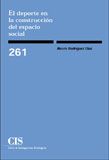New Spanish Books: The online guide of titles from Spanish publishers and literary agents with rights for translation in the UK. To consult titles available in other markets please click on the above links.
El deporte en la construcción del espacio social

Sport is a social practice that is riddled with mechanisms for partnership and group languages that are autonomous and interdependent. This finding was verified by research that collected data through field observation, personal interviews and statistical surveys carried out in Seville. Struggles and coexistence between the social agents of sport are social representations of tension and harmony, in a dialectic stage where State, Market and Society play their aspirations, resources and changing trading capabilities, resulting in a sports network that evolves and changes in society. One of the newest findings is the analysis of the spontaneous formation of sports associations in a course where individuals will constitute a community whose apparent bond is fondness for a specific physical game in a socially appropriate space. The sports and the way they are practised refer to representations of social class, distinctions between the segments of the same class, which are used to produce and reproduce social relations so that individuals and groups integrate and the same time differentiate.
